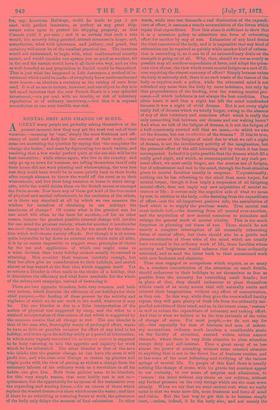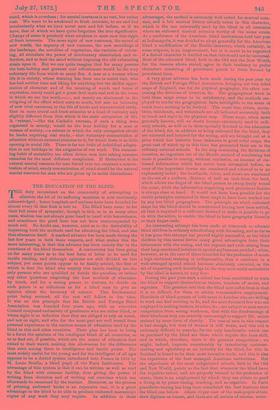MENTAL REST AND CHANGE OF SCENE.
AGREAT many people are probably asking themselves at the present moment how they may get the most rest out of their vacation,—meaning by ' rest,' simply the most freshness and effi- ciency of mind and body for the renewal of their work ;—and some are answering the question by saying that 'the completer the change the better,' and some by deprecating too much variety, and resolving that a few weeks' perfect quiet at the sea-side will be the best restorative ; while others again, who live in the country, and only go up to town for business, are telling themselves that if only their house did not want painting and whitewashing, the very best rest they could have would be to come quietly back to their books after enough absence to throw the world off the scent as to their whereabouts, and live their long vacation at home in strict incog- nito, while the world thinks them on the Scotch moors or amongst the Swiss snows. Now have any of these got hold of the true secret of physical and mental refreshment, to the exclusion of the others, or is there any standard at all by which we can measure the wisdom for ourselves of obtaining in our holidays the maximum of change ? Of course what is the greatest rest for one mind will often be the least for another,—if for no other reason, because the greatest possible external change will involve for one mind the greatest variety, where for another it involves far too much change to be really taken in, far too much for the relaxa- tion which well-chosen variety affords. But though it is of course quite impossible to lay down an external rule which suits all alike, it is by no means impossible to suggest some principles of choice by the use and application of which one might come to a wiser decision than hasty holiday-makers usually do succeed in attaining. Men consider their business carefully enough, but they too often give no consideration to their holidays, and snatch almost at hap-hazard at the first idea which suggests itself. Yet so serious a blander is often made in the choice of a holiday, that it diminishes the efficiency and vital force available for the whole of the subsequent campaign, instead of increasing it.
There are two opposite blunders, both very common and both very serious, which diminish the efficiency of our holidays for their chief purpose,—the feeding of those powers by the activity and vigilance of which we do our work in the world, whatever it may
be. The one blunder is due to a false interpretation of the notion of physical rest suggested by sleep, and the other to a strained interpretation of that notion of rest which is suggested by the common maxim that all change is rest. The one blunder is that of the man who, thoroughly weary of prolonged effort, wants to have as little as possible occasion for effort of any kind in his holiday, and looks upon his holiday solely as a period of hibernation, in which some vaguely conceived vis medicatris nature is supposed to be busy restoring to him the appetite and capacity for work which he has exhausted. The other blunder is that of the man
who thinks that the greater change he can have the more it will profit him, and who runs over Europe or strains up glaciers and virgin peaks with the view of getting as violent a change from the sedentary labours of his ordinary work as a revolution in all his habits can give him. Both these policies seem to be blunders, for this very simple reason, that even bodily rest is not mere quiescence, but the opportunity for an excess of the restorative over the expending and wasting forces,—for an excess of those which replace the wasted tissues over those which cause the waste ; and that if there be no rebuilding or restoring forces at work, the quiescence of the body only delays the moment of final exhaustion. In other words, while true rest demands a real diminution of the expendi- ture of effort, it assumes a steady accumulation of the forces which repair that expenditure. Now this alone is sufficient to show that it is a mistaken policy to substitute one form of exhausting effort for another by way of rest. Exhaustion of any kind drains the vital resources of the body, and it is impossible that any kind of
exhaustion can be repaired as quickly while another kind of exhaus- tion is succeeding it, as it can be if no extraordinary drain on the
strength is going on at all. Why, then, should we not as nearly as possible stop all needless expenditure of force, and adopt the quies- cent view of rest, the view which treats mental fatigue as a sort of ill- ness requiring the utmost economy of effort? Simply because unless
the body is seriously sick, there is no such waste of the tissues of the body as requires such a policy, while the exhausted mind is not refreshed any more than the body by mere indolence, but only by
that preponderance of the feeding, over the wasting mental pro- cesses—of which indolence is not always the best condition. One often hears it said that a night has left the mind unrefreshed because it was a night of vivid dreams. But is not every night really full of dreams which we totally forget, owing to the absence of any of that voluntary and conscious effort which is really the only connecting link between our dreams and our waking hours? And when we talk of the fatigue of dreams, is it not the fatigue.of a half-consciously exerted will that we mean,—to which we owe not the dreams, but our recollection of the dreams ? If this be true, the real cause of the fatigue of mind due to what we call a night of dreams, is not the involuntary activity of the imagination, but the personal effort of the still labouring will by which it has been accompanied. Indeed it is quite possible that the dreams which fill a really good night, and which, as unaccompanied by any such per- sonal effort, we most easily forget, are the sources not of fatigue, but of refreshment and rest to the mind, through the fresh stimulus given to mental faculties usually in suspense. Unquestionably, nothing can be less refreshing to the mind than mere torpor, for mental torpor, though it does imply a suspension of all fatiguing mental effort, does not imply any new acquisition of mental re- sources or life ; it covers only the negative side of what we mean by rest in relation to the body,—the desisting from the expenditure of effort—not the all-important positive side, the assimilation of food which is to supply the previous waste. True mental rest must include both,—the desisting from all mental over-exertion, and the acquisition of new mental resources to stimulate and enlarge the general stock of mental vitality. This is too mach forgotten in planning out times of rest. There should be not merely a complete interruption of all unusually exhausting forms of mental effort, bat there should also be a gentle and pleasant stimulus of those sides of the mind which are usually least exercised in the ordinary work of life, those faculties whose activity and brightness would enhance` that of those ordinarily exercised, and so send the latter back to their accustomed work with new freshness and elasticity.
Thus men engaged in occupations which require, as so many do, a constant concentration of the attention on small details,
should endeavour in their holidays to set themselves as free as possible from the necessity for controlling small details ; but in place of that, they should endeavour to place themselves within reach of as many scenes that will naturally excite and interest their imaginations, without any effort of concentration, as they can. In this way, while they give the overworkea faculty repose, they will gain plenty of fresh life from the ordinarily sus- pended activities of their mind, and so, in the truest sense, ' restore ' as well as reduce the expenditure of voluntary and tasking effort. And that is what we believe to be the true rationale of the value of change of scene. For most people,—we do not say for all,—but especially for men of business and men of sedent- ary occupations, ordinary work involves a considerable strain on the faculty of attention, exerted within rather narrow channels, where there is very little stimulus to close attention except duty and self-interest. Thus a great many of us lose almost the power of attending without some external stimulus to anything that is not in the direct line of business routine, and so lose some of the most refreshing and vivifying of the various springs of mental life. To people of this kind there is usually nothing like change of scene, with its gentle but constant appeal to our curiosity, to our sense of surprise and admiration, to ' restore ' the mind without any strain on our volition, without any further pressure on the very strings which are the most worn already. When we say that we want mental rest, what we really mean is that we want more life, more freshness and force of mind and vision. But the last way to get this is to become simply inert,—unless, indeed, it be the body also, and not merely the mind, which is overdone ; for mental inertness is no rest, but rather rust. We want to be awakened to fresh interests, to see and feel involuntarily what we have never seen and felt before, or if we have, that of which we have quite forgotten the true significance. Change of scene is precisely what awakens in most men this ripple of fresh interests. The mere sight of new costumes, the sound of new words, the urgency of new customs, the new mouldings of the landscape, the novelties of vegetation, the varieties of colour- ing, all stimulate the power of involuntary observation and re- flection, and so feed the mind without imposing the old exhausting strain upon it. But we can quite imagine that for many persons the best holiday and greatest real refreshment would be the very sedentary life from which so many flee. A man or a woman whose life is in society, whose training has been one in social tact, who has had neither time nor liking for anything but the skilful appre- ciation of character and of the meaning of words and turns of expression, surely could get a great deal more real rest in the sense in which we use the word,—i.e., not merely an abatement in the outgoing of the effort which costs so much, but also an incoming of new vital resources, in the life of books and concentrated study, than in mere travel and fresh stimulus to a kind of curiosity only slightly different from that which is the main occupation of life. A 'retreat,'—like the Catholic retreats, if such a thing were organised in society, would be the true holiday for a man or woman of society,—a retreat in which the only occupation should be books requiring real study,—that voluntary concentration of attention without external stimulus to it, for which there is so little opening in social life. There is far too little of individual adapta- tion in our holidays to the exigencies of our work. The unmean- ing habit of sociability too often drives men into taking common remedies for the most different complaints. If distraction is the natural mental resource for men forced into too constant a concen- tration of mind, surely concentration of mind should be the natural mental resource for men who are given up to social distractions.



































 Previous page
Previous page